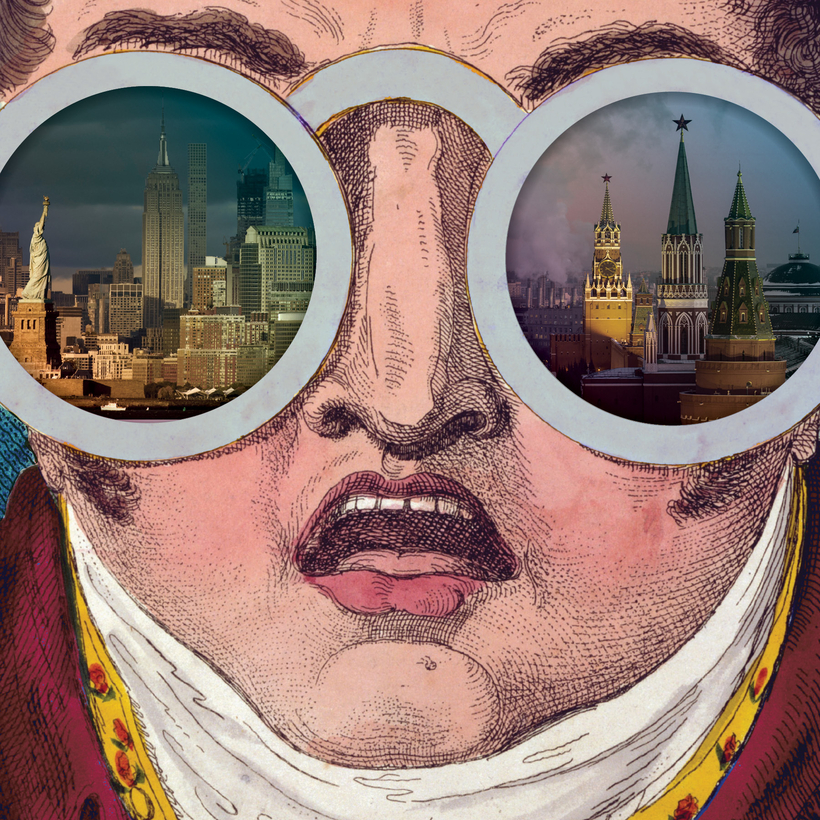Rich Russians are eyeing and buying expensive real estate in New York for the first time in a decade.
“We’re seeing a lot of Russian nationals. I’ve had five Russians look at properties in the $10 million to $20 million range in the past few weeks—condos and town houses,” a New York broker said.
One returning Russian just signed a contract for a $20 million trophy property in Midtown.
The buying spree is spurred by the cozy relationship between Trump and Putin, the broker said. “A couple of years ago, oligarchs couldn’t buy anything in the U.S., and Putin put pressure on Russians not to buy here or in Europe.”
Russians may also feel more reassured in the knowledge that, back in the day, their fellow nationals (including oligarchs and ex-cons) bought lots of Trump-branded properties. Some even found ways to provide Trump with cash when U.S. banks would not. Or, as Eric Trump told a golf reporter in 2014, “We have all the funding we need out of Russia.”
“They aren’t afraid to buy anymore,” the broker said about the current influx of oligarchs. “That’s what’s changed.”

And, thanks to Trump, there is less to fear. Sanctions against the Russian government, companies, and some individuals are still in place, but after only weeks in office, the administration took an ax to anti-corruption initiatives, disbanding Justice Department units such as Task Force KleptoCapture that investigated dirty money invested in assets like yachts and real estate. Trump also watered down the Corporate Transparency Act, making it easier for foreign investors to create American companies where they can park assets.
“If you are a Russian oligarch and your goal is to move, hide, and invest your dirty money in the U.S., you now have a new incentive to form an anonymous company inside the United States,” Scott Greytak, director of advocacy for Transparency International U.S., said.
Louise Shelley, a terrorism-and-transnational-crime expert at George Mason University, put it this way: “The oligarchy unit has been suspended, so the alarm bells are off. As long as you aren’t a narco cartel, you aren’t under special scrutiny.”
Rich Russians have caught on. It’s easier, again, to move illicit funds to the U.S. without scrutiny, and they feel there is less risk for themselves of prosecution.
That said, Trump had threatened Russia with additional sanctions if Putin did not “make a deal” for peace. On April 2, the U.S. expanded its sanctions on Russian companies Edison, Kolibri Group, and Sky Frame—part of an Iran-backed network that sent weapons and more from Russia to the Yemeni Houthis.
On the other hand, Trump removed sanctions on Karina Rotenberg, the wife of Vladimir Putin’s close friend Boris Rotenberg, a U.S. citizen since at least 2013.
And then there are Trump’s new tariffs. Russia is notably absent from the global list—ostensibly because it is already sanctioned. But, last year, Russia still exported more than $3 billion worth of goods to the U.S. That’s far more than other countries on the tariffs list, like Laos and Fiji. (It’s still an open question whether the administration used A.I. to do the tariff math, and got it wrong.)
So there are rewards but also plenty of risks. Shelley cautioned: “With the absence of stability in U.S.-Russia relations, it seems premature for individuals without past residence to make large investments.”
A former adviser to wealthy Russians and other ex–Soviet nationals called new investment “suicidal”—until there is peace in Ukraine. “There are still too many uncertainties,” the source said. “Putin continues to speak as if the U.S. is an enemy. They are aligned with North Korea and others we have no interest in. The political situation is still extremely tense. I don’t see anything changing until an actual peace deal is signed or until all sanctions are removed.”
Most of the Russians who are now back and buying in New York were educated in the U.S. and owned property here before moving to Dubai, Geneva, London, Monaco, and other international cities. They also hold multiple passports, a broker said.
For Russian passport holders, however, obtaining a U.S. visa is still difficult, said Victoria Logvinsky, a Ukrainian-born broker at Douglas Elliman. A few weeks ago, Logvinsky moved back to New York after living in Monaco and the South of France for the past few years—while keeping her brokerage team in place in New York.
“My Russian clients in Monaco are starting to look into buying properties again, but they can’t get here because of visas,” she said.
“Russian buyers are hopeful to see the easing of restrictions to purchase properties in the U.S. after heavily investing in Dubai, Monaco, and Turkey over the past few years,” Logvinsky said. “Russian families value American private schools and universities and see long-term investment in U.S. real estate as a valuable opportunity.” She noted that they also appreciate the high quality of new construction.
Some Russians and other foreign nationals also hope they can participate in Trump’s proposed golden visa, issued for $5 million—a bargain! But China experts are warning that the visa could be harmful to U.S. national security, and consequently the potential visa may soon be off the table.
U.S.-Russian relations cooled following Moscow’s 2014 annexation of Crimea. It may be hard to believe now, but in 2018, Trump, hemmed in during his first term by hawkish minders such as National-Security Adviser H. R. McMaster, hit Russia hard with sanctions for its “malign influence” around the globe, including election interference.
Less than a week after Russia’s full-scale invasion of Ukraine in 2022, then president Biden launched Task Force KleptoCapture. The Trump administration disbanded the task force in February.
“Trump has a tradition to sell real estate to Russians, and he thinks they are a good investment for the country. He doesn’t think of the downstream effects that we see. They aren’t of consequence to him,” Shelley said.
Trump’s cozy relationship with Russia goes back decades—to some of the first buyers at Trump Tower, such as convicted gasoline bootlegger and Russian mobster David Bogatin, who bought at least five condos there in the 1980s. In the 1990s, the F.B.I. discovered that a Russian Mob boss, Vyacheslav Ivankov, was hiding out in a luxury Trump Tower unit.
In 2008, when Trump couldn’t get a U.S. bank loan, Russian oligarch Dmitry Rybolovlev paid $95 million for a Palm Beach mansion that Trump had bought for $41.35 million four years earlier (outbidding convicted pedophile Jeffrey Epstein)—handing Trump a $54 million profit.
The same year, Donald Trump Jr. told a New York real-estate conference that “in terms of high-end product influx into the U.S., Russians make up a pretty disproportionate cross section of a lot of our assets. Say, in Dubai, and certainly with our project in SoHo, and anywhere in New York. We see a lot of money pouring in from Russia.”

By 2013, there was even a Russian-American organized-crime gambling-and-money-laundering/extortion/racketeering ring running out of Trump Tower apartment 63A (which is now on the market for $9.7 million, and where the current seller, poker champ Vadim Trincher, was once under house arrest for his role in the criminal activities).
More than $100 million was laundered—including at least $50 million in U.S. real estate and hedge funds. Southern District of New York prosecutors indicted 34 people, including fellow Trump Tower resident Helly Nahmad, the son of a billionaire art-dealer family, and a Russian Mob boss, Alimzhan Tokhtakhunov (whose claim to fame was being indicted for fixing an Olympic ice-skating competition in 2002). Tokhtakhunov evaded arrest but surfaced later that year near Donald Trump in the V.I.P. section of the Miss Universe pageant in Moscow.
In 2015, there were estimates that 52 percent of all Russian wealth was held outside the country. In 2017, a Reuters investigation found that 63 Russians paid a total of $98.4 million for properties in seven Trump-branded luxury towers in Sunny Isles, Florida.
The Russian return is a natural outcome of Trump’s recent executive orders, said Anders Aslund, a senior fellow at the Stockholm Free World Forum and a professor at Georgetown University’s Center for Eurasian, Russian and East European Studies.
“It is quite natural. It’s about the executive orders that Trump issued to soften money-laundering restrictions.”
He added, “The dirty money can all come back.”
Jennifer Gould is a columnist at the New York Post. She covers real estate, money-laundering, and global corruption


